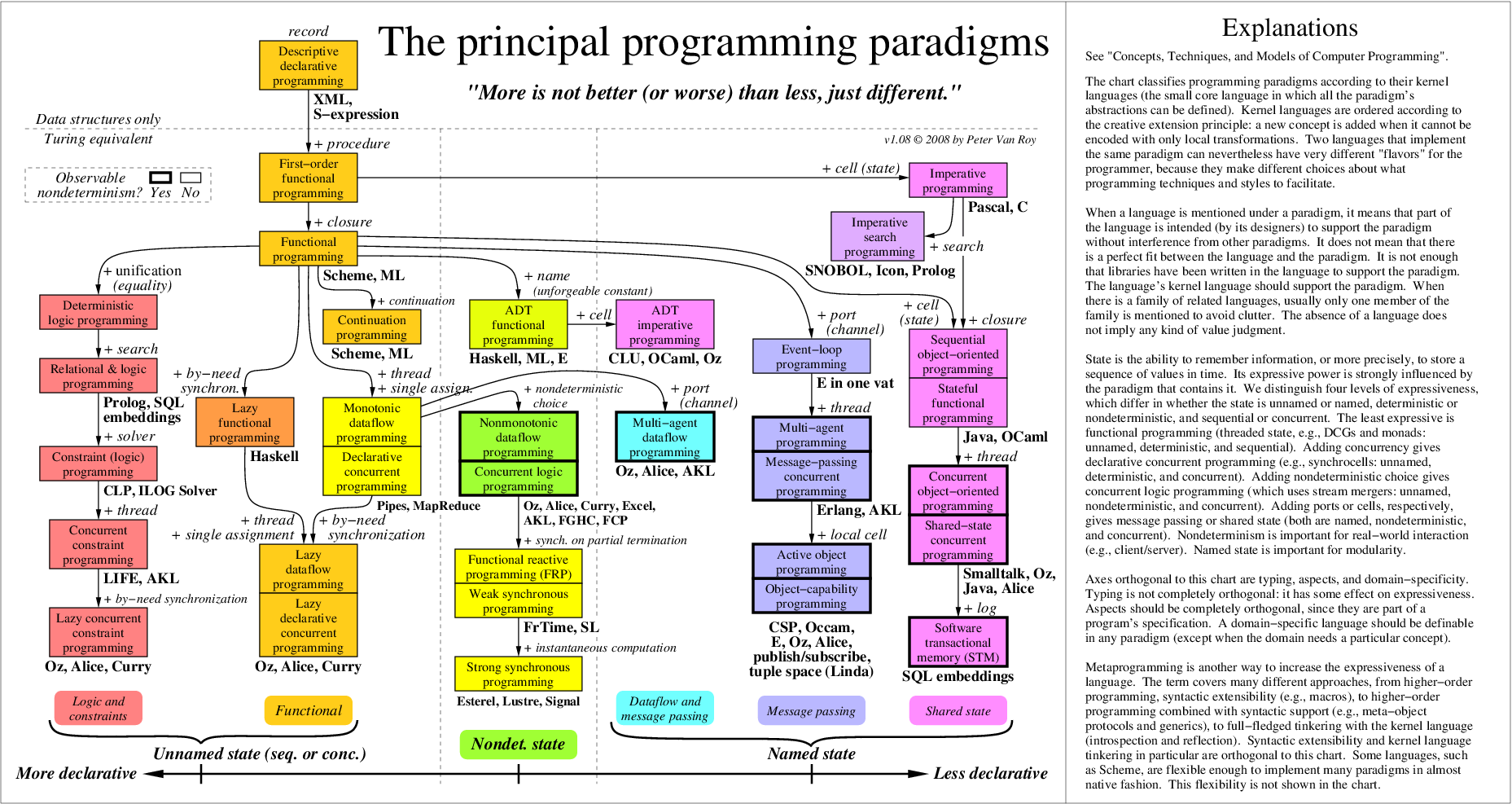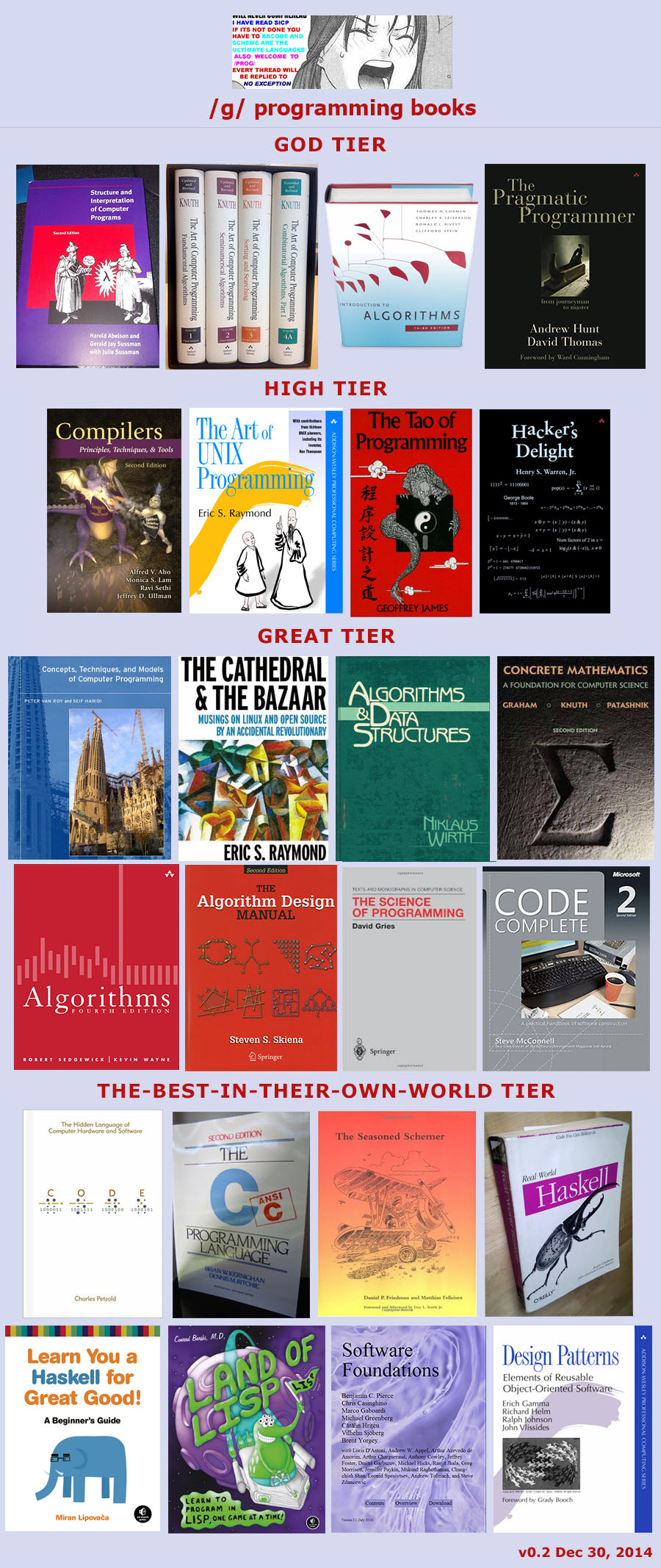hello friends! new(ish)!
Programming resources: Difference between revisions
Jump to navigation
Jump to search
>Mrsnooze m category:recommendations |
>Mrsnooze m fixed interwiki links |
||
| Line 13: | Line 13: | ||
These books are essential books that people should have, or at least have read or know about: | These books are essential books that people should have, or at least have read or know about: | ||
* [ | * [[Wikipedia:Compilers:_Principles,_Techniques,_and_Tools |Compilers: Principles, Techniques and Tools]] (a.k.a The Dragon Book). This book is loaded with all the theory and concepts needed to design, implement and optimise a compiler. It's the go-to compiler book. | ||
* [ | * [[Wikipedia:Operating_Systems:_Design_and_Implementation |Operating Systems: Design and Implementation]] (a.k.a the MINIX book). This is one of the books [[Linus Torvalds]] used to write the original Linux kernel. This also contains over 500 pages of the entire MINIX source code at the back as an appendix, and if you're lucky, a MINIX installation CD with instructions. | ||
* [ | * [[Wikipedia:The_Art_of_Computer_Programming |The Art of Computer Programming]] by Donald Knuth (essentially the holy grail of [[Computer Science]] literature). Bill Gates said that if anyone can read every volume in TAOCP from cover to cover, then they should definitely send him their CV/Resume. | ||
* [https://www.cs.cmu.edu/~15712/papers/mythicalmanmonth00fred.pdf The Mythical Man Month: Essays on Software Engineering]. A compilation of essays on what experienced software engineers and programmers have learned from their successes and failures over many years. | * [https://www.cs.cmu.edu/~15712/papers/mythicalmanmonth00fred.pdf The Mythical Man Month: Essays on Software Engineering]. A compilation of essays on what experienced software engineers and programmers have learned from their successes and failures over many years. | ||
* [ | * [[Wikipedia:Design_Patterns |Design Patterns: Elements of Reusable Object-Oriented Software]]. Design patterns and principles designed to help object-oriented software. | ||
* [ | * [[Wikipedia:The_Cathedral_and_the_Bazaar |The Cathedral and the Bazaar]]. Eric S. Raymond's book on Closed-house development (cathedral) vs open-source, distributed development (bazaar), and how the latter is much more effective. | ||
* The C Programming Language, mentioned below. Also known as K&R because it was written by the founders of C, Brian '''K'''ernighan and Dennis '''R'''itchie. | * The C Programming Language, mentioned below. Also known as K&R because it was written by the founders of C, Brian '''K'''ernighan and Dennis '''R'''itchie. | ||
* Structure and Interpretation of Computer Programs, listed below | * Structure and Interpretation of Computer Programs, listed below | ||
* [http://books.cat-v.org/computer-science/unix-programming-environment/ The UNIX Programming Environment, 2nd edition] An excellent introductory *nix book. Written by Brian Kernighan (of K&R) and Rob Pike (Plan9, Golang), both of whom were part of the Unix team at Bell Labs. | * [http://books.cat-v.org/computer-science/unix-programming-environment/ The UNIX Programming Environment, 2nd edition] An excellent introductory *nix book. Written by Brian Kernighan (of K&R) and Rob Pike (Plan9, Golang), both of whom were part of the Unix team at Bell Labs. | ||
* [http://basepath.com/aup/ Advanced UNIX Programming, 2nd Edition] Recommended as a follow on book from The UNIX Programming Environment. Contains information on over 300 syscalls. | * [http://basepath.com/aup/ Advanced UNIX Programming, 2nd Edition] Recommended as a follow on book from The UNIX Programming Environment. Contains information on over 300 syscalls. | ||
* [ | * [[Wikipedia:The_Pragmatic_Programmer |The Pragmatic Programmer]] Cuts through the increasing specialization and technicalities of modern software development to examine the core process—what do you do, as an individual and as a team, if you want to create software that’s easy to work with and good for your users. | ||
* [ | * [[Wikipedia:Introduction_to_Algorithms |Introduction to Algorithms]] The book covers a broad range of algorithms in depth, yet makes their design and analysis accessible to all levels of readers. | ||
* [ | * [[Wikipedia:The_Tao_of_Programming |The Tao of Programming]] The themes of the book espouse many hacker ideals – managers should leave programmers to their work; code should be small, elegant, and maintainable; corporate wisdom is more often than not an oxymoron; and so on. | ||
* [http://www.hackersdelight.org/ Hacker's Delight] It discusses a variety of programming algorithms for common tasks involving integer types, often with the aim of performing the minimum number of operations or replacing slow operations by faster ones. | * [http://www.hackersdelight.org/ Hacker's Delight] It discusses a variety of programming algorithms for common tasks involving integer types, often with the aim of performing the minimum number of operations or replacing slow operations by faster ones. | ||
* [ | * [[Wikipedia:Code_Complete |Code Complete]] A compendium of software construction techniques, from naming variables to deciding when to write a subroutine. | ||
== Ada == | == Ada == | ||
Revision as of 04:53, 11 March 2016

The following is a list of recommended books for learning how to program:
First, check GitHub's extensive list of free programming books: https://github.com/vhf/free-programming-books/blob/master/free-programming-books.md
The gentoomen have also provided a torrent/magnet link which has a metric fuckton of books, and if you prefer actual physical books, you can get them for really cheap from http://abebooks.com
If you don't see the book you're looking for listed, search the following lists for other sources of books:
God-tier books

These books are essential books that people should have, or at least have read or know about:
- Compilers: Principles, Techniques and Tools (a.k.a The Dragon Book). This book is loaded with all the theory and concepts needed to design, implement and optimise a compiler. It's the go-to compiler book.
- Operating Systems: Design and Implementation (a.k.a the MINIX book). This is one of the books Linus Torvalds used to write the original Linux kernel. This also contains over 500 pages of the entire MINIX source code at the back as an appendix, and if you're lucky, a MINIX installation CD with instructions.
- The Art of Computer Programming by Donald Knuth (essentially the holy grail of Computer Science literature). Bill Gates said that if anyone can read every volume in TAOCP from cover to cover, then they should definitely send him their CV/Resume.
- The Mythical Man Month: Essays on Software Engineering. A compilation of essays on what experienced software engineers and programmers have learned from their successes and failures over many years.
- Design Patterns: Elements of Reusable Object-Oriented Software. Design patterns and principles designed to help object-oriented software.
- The Cathedral and the Bazaar. Eric S. Raymond's book on Closed-house development (cathedral) vs open-source, distributed development (bazaar), and how the latter is much more effective.
- The C Programming Language, mentioned below. Also known as K&R because it was written by the founders of C, Brian Kernighan and Dennis Ritchie.
- Structure and Interpretation of Computer Programs, listed below
- The UNIX Programming Environment, 2nd edition An excellent introductory *nix book. Written by Brian Kernighan (of K&R) and Rob Pike (Plan9, Golang), both of whom were part of the Unix team at Bell Labs.
- Advanced UNIX Programming, 2nd Edition Recommended as a follow on book from The UNIX Programming Environment. Contains information on over 300 syscalls.
- The Pragmatic Programmer Cuts through the increasing specialization and technicalities of modern software development to examine the core process—what do you do, as an individual and as a team, if you want to create software that’s easy to work with and good for your users.
- Introduction to Algorithms The book covers a broad range of algorithms in depth, yet makes their design and analysis accessible to all levels of readers.
- The Tao of Programming The themes of the book espouse many hacker ideals – managers should leave programmers to their work; code should be small, elegant, and maintainable; corporate wisdom is more often than not an oxymoron; and so on.
- Hacker's Delight It discusses a variety of programming algorithms for common tasks involving integer types, often with the aim of performing the minimum number of operations or replacing slow operations by faster ones.
- Code Complete A compendium of software construction techniques, from naming variables to deciding when to write a subroutine.
Ada
- Programming in Ada 2012 by John Barnes
C
- The C Programming Language] by Brian Kernighan and Dennis Ritchie (PDF download)
- O'Reilly - Practical C Programming] (PDF download)
- C Programming: A Modern Approach by K. N. King
C++
- C++ for Everyone, 2nd ed. (PDF download)
- Accelerated C++ 2000 (PDF download)
C#
- Apress Accelerated C# 2010 (PDF download)
Forth
- Thinking Forth (PDF download)
Java
- Java, A Beginner's Guide by Herbert Schildt
- Head First Java, 2nd Edition by Kathy Sierra & Bert Bates
- Effective Java by Joshua Bloch
- Thinking in Java by Bruce Eckel
Haskell
- Learn You a Haskell for Great Good! (Read it online)
- Real World Haskell (Read it online)
Lisp
Scheme
- Structure and Interpretation of Computer Programs (Read it online)
- The Little Schemer
- The Seasoned Schemer
- The Reasoned Schemer
- The Realm of Racket (Website for the book)
- How to Design Programs, 2nd Edition (Read it online)
Common Lisp
- Common Lisp: A Gentle Introduction to Symbolic Computation (PDF download)
- Practical Common Lisp (Read it online)
- On Lisp (PDF and Postscript download)
- Let Over Lambda (Website for the book) (The first six chapters)
- The Land of Lisp (Website for the book)
Pascal
- Essential Pascal (PDF download)
- Tutorials Point Pascal (PDF download)
- Start Programming Using Object Pascal (PDF download)
Ruby
- The Ruby Programming Language by David Flanagan and Yukihiro Matsumoto
- Ruby In A Nutshell by Yukihiro Matsumoto
- Programming Ruby 1.9 & 2.0 (4th edition) (a.k.a. The Pickaxe) by Dave Thomas, Chad Fowler and Andy Hunt
- Metaprogramming Ruby by Paolo Perrotta
- Eloquent Ruby by Russ Olsen
- The Well-Grounded Rubyist by David A. Black
Python
- Invent Your Own Computer Games with Python (Read it online)
- Making Games with Python and Pygame (Read it online)
- Hacking Secret Ciphers with Python (Read it online)
- Starting Out with Python, 2nd ed. (PDF download)
- Think Python: How to Think Like a Computer Scientist, Ver 2.0.12 (Read it online)
- Learn Python The Hard Way, 3rd Edition (Read it online)